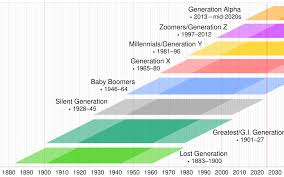The Importance and Impact of Gen Z Years

Introduction
The years that define Generation Z, commonly referred to as Gen Z, range from the mid-to-late 1990s through the early 2010s. This cohort of young individuals has grown up in an era marked by rapid technological advancements, shifting social dynamics, and global challenges, rendering their experiences significantly different from previous generations. Understanding the trends and characteristics of Gen Z years is vital for educators, employers, and policymakers, as they navigate the changing landscape of societal values, career aspirations, and consumer behaviour.
The Defining Characteristics of Gen Z
As one of the first generations to grow up with the internet and smartphones, Gen Z is defined by their digital fluency. According to a Pew Research Center survey, approximately 95% of Gen Z teenagers own a smartphone, and 45% are online almost constantly. Their engagement with technology has shaped their perspectives, making them more informed yet more anxious about issues such as climate change, inequality, and mental health.
Current Events and Influence
Recent research reveals that Gen Z’s values significantly influence market trends. For instance, a 2023 Deloitte report highlighted that 65% of Gen Z prefers brands that take a stand on social issues. This generation is passionate about sustainability; 77% express concern about climate change and actively seek out environmentally friendly products.
Moreover, the COVID-19 pandemic has had a profound impact on Gen Z years. Many young individuals faced unprecedented challenges such as disruptions to education and increased mental health concerns. A study by the American Psychological Association found that 71% of Gen Z expressed feeling stressed about the pandemic’s effects. Their resilience, however, has led to innovation, as many have turned to virtual platforms for education, connection, and entrepreneurship.
Conclusion
Understanding the nuances of Gen Z years is essential, given their influence on contemporary culture and future trajectories. As this generation shapes the workforce and consumer markets, acknowledging their values, challenges, and ambitions will be crucial for establishing meaningful connections with them. As they continue to rise in prominence, their perspectives can drive positive change in society, notably in areas concerning diversity, sustainability, and mental health awareness. Employers, educators, and leaders must adapt to meet the expectations set forth by Gen Z, reinforcing the need for dialogue that values their insights and experiences.








